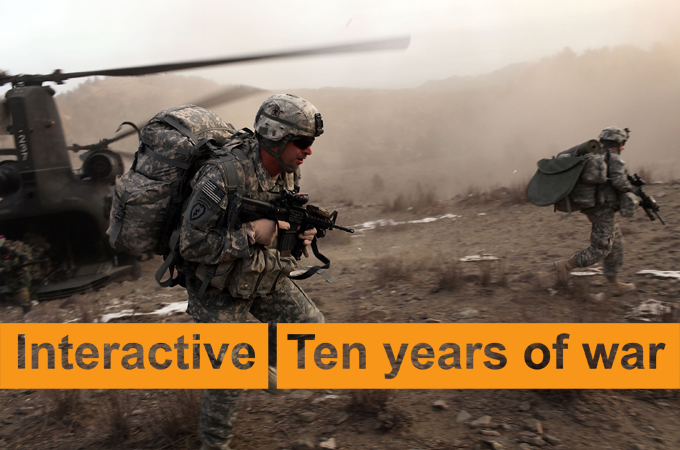US military chief says Afghan pullout ‘risky’
Mike Mullen says Obama’s plan is aggressive but still manageable and will not jeopardise military’s strategy.

A day after Barack Obama announced US troop pullout from Afghanistan, the highest-ranking US military officer has told a House of Representatives committee hearing that the president’s faster-than-expected drawdown created “new risks”.
Obama announced on Wednesday evening that the US and its allies had achieved enough in Afghanistan to merit a drawdown of forces beginning this summer.
“The president’s decisions are more aggressive and incur more risk than I was originally prepared to accept,” Admiral Mike Mullen, chairman of the Joint Chiefs of Staff, said on Thursday.
“More force for more time is, without doubt, the safer course.”
Mullen, however, assured the House that the risks, although increased, were still manageable and would not jeopardise the military’s counter-insurgency mission.
 |
In a separate testimony on Thursday to the Senate Foreign Relations Committee, Hillary Clinton, the US secretary of state, tacitly acknowledged the military had wanted more troops to remain for a longer period of time.
“I think it would be totally understandable that a military commander would want as many troops for as long as he could get them,” she said.
But she said “despite the many challenges that remain, life is better for most Afghans”.
“So, at the end of the day, I think that the president made the right decision,” Clinton said.
US officials are increasingly looking to a potential political solution, eventually bringing Taliban to the
negotiating table.
In fact, Clinton acknowledged preliminary outreach at the Senate hearing.
“We believe that a political solution … is possible. The United States has a broad range of contacts at many levels across Afghanistan and the region … including very preliminary outreach to members of the Taliban,” she said.
She said that “this is not a pleasant business,” but part of efforts to end the insurgency.
Earlier in the day, the Afghan president said that Obama had made the right decision with his drawdown plan.
“The Afghan people’s trust in the Afghan army and police is growing every day and preservation of this land is the job of Afghans,” Hamid Karzai said.
“I welcome the decision of the US president today on pulling out [some of] … its troops from Afghanistan and I consider this a right decision for the interest of both countries.”
Taliban rejects pullout
The Taliban, for its part, dismissed Obama’s withdrawal plan as “only as a symbolic step”, in a statement released on Thursday.
The Taliban “considers this announcement, which currently withdraws 10,000 soldiers this year, only as a symbolic step which will never satisfy the war-weary international community or the American people”, it said.
The statement accused the US of “repeatedly giving false hopes to its nation about ending this war and claiming baselessly about victory”.
Obama’s plan to begin withdrawing the extra forces he put in place in 2009 as part of troop “surge” would see 10,000 troops depart this year, beginning in July, and another 23,000 next summer.
The US currently has about 100,000 troops in Afghanistan. After the drawdown, around 68,000 will remain, but they will leave at a “steady pace”, and by 2014 the United States will have turned over security responsibility to Afghan forces, Obama said.
Al Jazeera’s Bernard Smith, reporting from Kabul, said the immediate reaction from people in Afghanistan was disappointment.
| More on Afghanistan | ||||||||
|
“A lot of Afghans feel that the Americans are leaving them mid-fight – they feel there is still a fight to be fought against the Taliban here,” he said.
“It’s nearly 10 years ago that the Americans took just two weeks to remove the Taliban from power, and in that time the Taliban have come back.”
“Some in leadership of the Afghan government have been putting on a brave face on this. They believe that their army and police are, in some places, in a position to take over the security responsibility.”
The Obama administration has argued that the surge has helped force the Taliban to accept negotiations with NATO forces and the Afghan government, led by President Hamid Karzai.
In his speech, Obama said that only a political settlement that involves the Taliban would bring peace to Afghanistan.
But it is still unclear whether the Taliban will join talks while US forces remain on Afghan territory.
The post-surge fighting against the Taliban led to a spike in US casualties: 650 of the roughly 1,600 American soldiers who have been killed since 2001 have died in the past 18 months.
Many more Afghan civilians have died – at least 9,759 since 2006, according to the United Nations.
Allies for gradual pullout
On the heels of Obama’s pullout plan, came French president Nicolas Sarkozy’s announcement of an exit strategy for his troops.
Sarkozy said in a statement that he would oversee a pullout “in a proportional manner and in a calendar comparable to the withdrawal of American reinforcements”.
France’s 4,000-strong contingent is the fourth largest in Afghanistan.
Other European allies like Germany, Poland and Spain have also said they would proceed with a gradual drawdown.
Guido Westerwelle, the German defence minister, said his country, with 4,800 troops, hoped “to reduce contingent for the first time” by the end of the year.